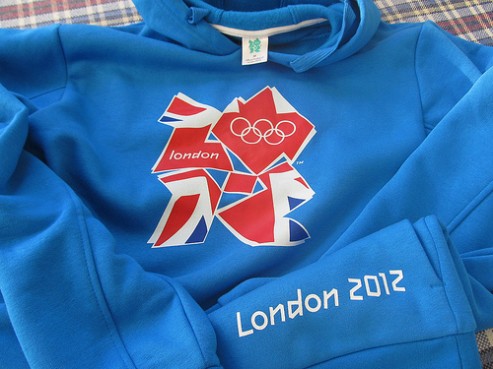Should Spending Cash Be a Branded Experience?
This summer in London, when Michael Phelps tweets, he had better be careful: if he writes about a brand that competes with one of the Olympic Games’ official sponsors, he could find himself in serious trouble. The London Games, apparently in order to secure corporate sponsorships, will have some of the strictest branding regulations of any sporting event, ever. Athletes cannot tweet about the wrong brands, and attendees cannot even wear clothing with the logos of brands that compete with Olympic sponsors. Visa is the only payments sponsor of the event, and due to the strict branding rules, they might make it nightmarishly difficult to access cash at the Games.

The Guardian reports that Visa’s sponsorship deal with the Olympics in London might very well lead to a “cash-starved” event. Visa, as the sole payments sponsor of the games, has a monopoly on all payments done there. Not only were customers only allowed to purchase Olympics tickets with Visa cards, they will only be able to withdraw cash from Visa ATMs, with a Visa card. Furthermore, reports The Guardian, Visa will be removing 27 off-brand ATMs and replacing them with eight of its own.
Fortunately however, The Guardian points out that nearly 97 percent of debit cards are Visa-branded in the UK anyway, and that contactless payments and debit payments will be accepted at most vendors. So this is OK, right? Almost certainly not.
The most surveilled city in the entire world will add another layer of surveillance in the form of the Brand Exclusion Zone, within which, your ability to use a MasterCard or wear a Mountain Dew shirt will be seriously limited by Visa’s ATMs and a team of “branding police” according to another Guardian story. LOCOG (the London Organising Committee of the Olympic and Paralympic Games; not to be confused with INGSOC) has given the branding police “the power to remove or tape over manufacturers’ logos even on soap dispensers, wash basins and toilets.” A post on Kosmograd says this brand exclusion extends to what attendees wear, in an effort to prevent guerrilla marketing by non-sponsoring brands.
Let us reiterate: this is 100 percent true. This is not a satire of the absurdities of late capitalism, it is not from an upcoming dystopian novel we are working on, it is definitely happening in London. At a sporting event that, in theory, is about showcasing the best humanity has to offer — our ability to put aside bloody international conflicts to revel in our athletic talents — corporations have made it so that LOCOG must police attendees about the clothing they wear.
And in particular, Visa has made access to cash a.) limited by design and b.) a police-enforced, branded experience. Think about things like this next time you breathlessly endorse the end of cash! Your use of electronic forms of payment is contingent on the existence of two massive payments processors who have a duopoly on the market, and as corporate sponsorship of seemingly public events and spaces becomes more prevalent, their control over how you spend money will grow. If, ostensibly, we desire more freedom from electronic forms of payment (the freedom to not carry a wallet, the freedom from fear of fraud, etc), then we should consider what freedoms we give up when we go cashless.
Here’s an interesting thought on the matter from Will Davies:
We need to rediscover the emancipatory and subversive potential of dirty, anonymous, paper cash. The cash that transfixed Georg Simmel. The fungibility that attracted Hayek. The bank notes kept in large bundles in the back of dodgy-looking BMWs. The dollar bills that pile up on New York bars as tips. Cash has a liquidity that defies corporate management, and irritates the marketing industry, to the point where they try to ban cash-payers from certain entertainment venues or services.
This is what we give up when we breathlessly cheer on each and every technological advance that we make in the payments world: our freedom, plain and simple.
The other patently absurd aspect of the Visa ATM situation is that it could, in theory limit the amount of money spent at the Olympics by limiting access to cash, which would be an unfortunate outcome from the marketing department of a payments company. Of course, on the other hand, that might not matter to Visa. The company doesn’t care how much money is spent at the games — LOCOG should, however — it cares how much money is spent on its network, and its police-enforced monopoly, made more effective by cutting ATMs to a quarter of their capacity, put more people in Visa’s funnel. It’s deeply ironic that through its efforts to be so thoroughly branded, the London Olympics could diminish the amount of money spent at vendors.
Or perhaps it will be the cash-free utopia so many tech boosters breathlessly crave. European ATMs, with their EMV technology, are a pain in the neck for us Americans anyway. Bring on our branded future, corporate overlords! — we promise to make you happy.

